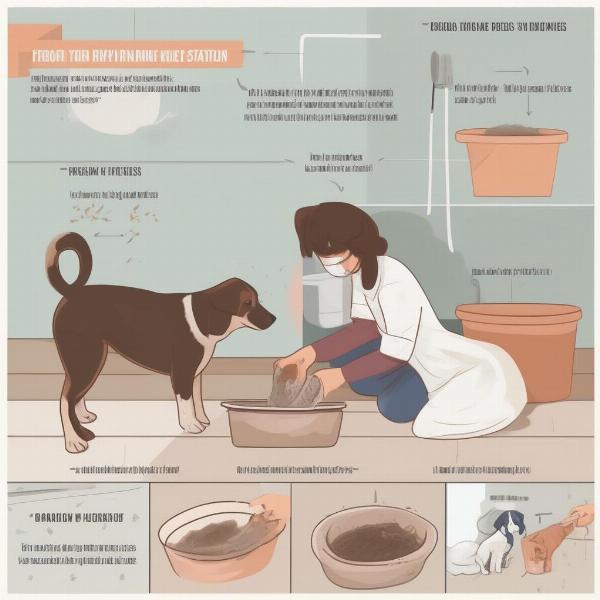Natural worming for dogs is a growing trend among pet owners seeking gentler alternatives to conventional chemical dewormers. This approach focuses on using natural ingredients and remedies to prevent and treat intestinal parasites in dogs. While chemical dewormers can be effective, some pet owners have concerns about potential side effects and the development of parasite resistance. Natural worming methods offer a potentially safer and more sustainable approach to parasite control.
Understanding the Need for Worming
Worms are common intestinal parasites that can affect dogs of all ages and breeds. These parasites can cause a range of health issues, from mild digestive upset to more serious complications like anemia and malnutrition. Regular worming is essential to protect your dog’s health and prevent the spread of parasites to other animals and even humans.
Common Types of Worms in Dogs
Several types of worms can infest dogs, including roundworms, hookworms, whipworms, and tapeworms. Each type of worm has unique characteristics and can cause different symptoms. Understanding the specific type of worm your dog has is crucial for effective treatment.
Natural Worming Methods for Dogs
Several natural remedies can be used to prevent and treat worms in dogs. These remedies are often gentler on the digestive system and may offer additional health benefits.
Food-Based Worming Remedies
Certain foods have natural worming properties and can be incorporated into your dog’s diet.
- Pumpkin Seeds: Rich in cucurbitacin, an amino acid that paralyzes worms, making them easier to expel.
- Carrots: The high fiber content in carrots can help sweep worms out of the digestive tract.
- Apple Cider Vinegar: Creates an acidic environment in the gut that is less hospitable to parasites.
- Garlic: Contains allicin, a compound with potent anti-parasitic properties. Use with caution, as large amounts can be toxic to dogs.
Herbal Remedies for Worms
Several herbs have traditionally been used for their worming properties.
- Wormwood: A bitter herb known for its effectiveness against various intestinal parasites.
- Black Walnut: Contains juglone, a compound that can help expel worms.
- Cloves: Possess antiseptic and anti-parasitic properties that can aid in worm control.
When to Consult a Veterinarian
While natural worming methods can be effective, it’s crucial to consult with your veterinarian, especially if your dog is showing signs of a heavy worm infestation. Symptoms such as vomiting, diarrhea, weight loss, and a pot-bellied appearance should be addressed immediately. Your veterinarian can perform diagnostic tests to identify the specific type of worm and recommend the most appropriate treatment plan.
Preventing Worm Infestations
Prevention is always better than cure. Regular cleaning of your dog’s living area, proper disposal of feces, and avoiding contact with infected animals can significantly reduce the risk of worm infestations.
 Preventing Worm Infestations in Dogs
Preventing Worm Infestations in Dogs
Conclusion
Natural worming for dogs offers a holistic approach to parasite control. By incorporating natural remedies and practicing good hygiene, you can help protect your dog from the harmful effects of intestinal worms. Remember to consult your veterinarian for guidance and to ensure the safety and effectiveness of any natural worming protocol.
FAQ
- What are the signs of worms in dogs? Common signs include vomiting, diarrhea, weight loss, a dull coat, and scooting.
- How often should I deworm my dog? Consult your veterinarian for a personalized deworming schedule.
- Are all natural worming remedies safe for dogs? Not all remedies are safe. Consult your veterinarian before using any new remedy.
- Can I use natural worming methods alongside conventional dewormers? Discuss this with your veterinarian to determine the best approach for your dog.
- How can I prevent my dog from getting worms? Practice good hygiene, avoid contact with infected animals, and follow your veterinarian’s recommended deworming schedule.
- Is natural worming effective for all types of worms? Not all natural methods are effective against all types of worms.
- Can puppies be given natural worming remedies? Consult with your vet before giving any remedies to puppies.
About ILM Dog
ILM Dog is your trusted source for expert advice on all aspects of dog care and well-being. We offer a wealth of information on dog breeds, health and medical care, training and behavior, nutrition, grooming, and much more. From puppy care to senior dog care, we cover it all. Our mission is to empower dog owners worldwide with the knowledge they need to provide the best possible care for their furry companions. We also specialize in advice on products and accessories to enhance your dog’s life. Contact us for expert advice: Email: [email protected], Phone: +44 20-3965-8624.